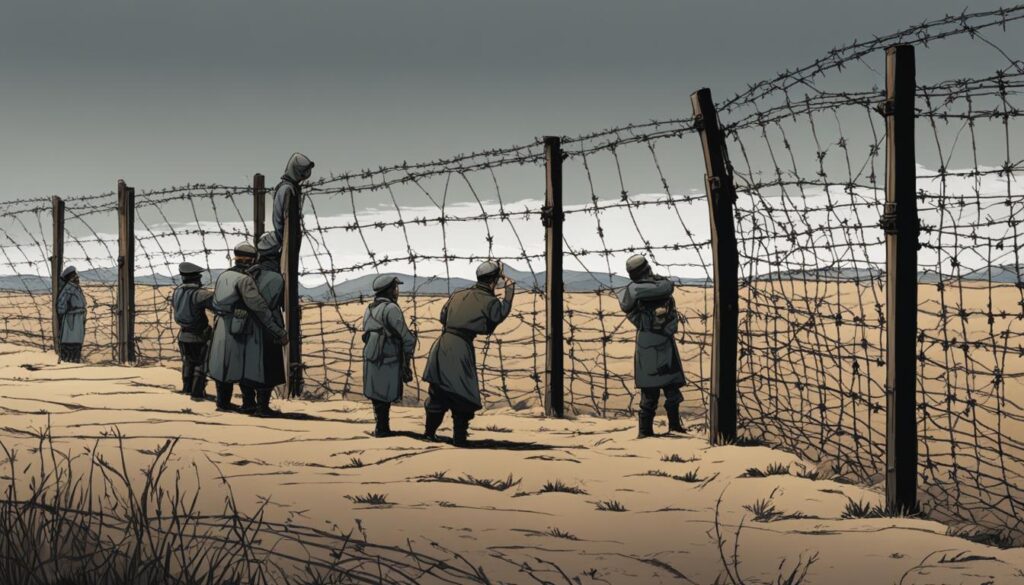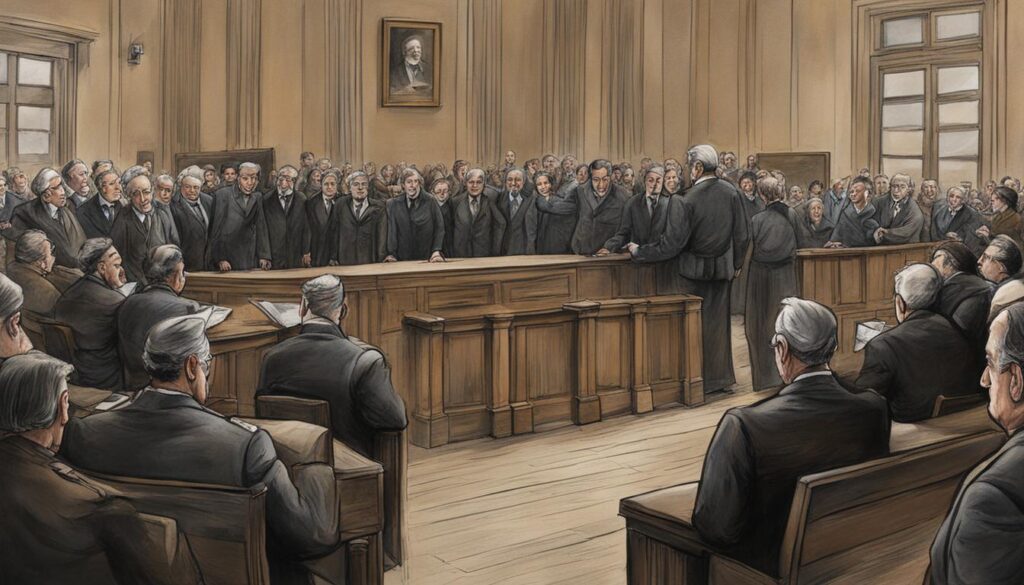Are you interested in exploring the history of Holocaust denial and its impact on the David Irving trial? Look no further than Richard J. Evans’ “Lying About Hitler.” In this comprehensive book summary, we examine Evans’ analysis of the landmark case and his critical exploration of Irving’s revisionist claims. Discover the undeniable facts about the Holocaust and the survival stories of those who experienced it firsthand. Join us as we explore the legal proceedings, research, and counterarguments that challenged Holocaust denial and upheld historical truth.
Introduction to “Lying About Hitler”
Richard J. Evans’ “Lying About Hitler” offers a comprehensive analysis of Holocaust denial and the David Irving trial. In this book, you will gain an overview and introduction to the author’s motivations and objectives behind challenging revisionist claims.
The book summary discusses Evans’ meticulous research, as he explores the historical background of Holocaust denial and the rise of David Irving as a revisionist historian. Furthermore, he delves into the legal proceedings of the Irving trial and examines the significance of this landmark case.
Through this overview, you will gain an understanding of the critical approach taken by Evans to dismantle distorted arguments and challenge Holocaust denial. We will also explore the impact of the book on the historical discourse and consider critiques and controversies surrounding its content.
Join us on a journey through the pages of “Lying About Hitler” as we explore this powerful response to Holocaust denial and a testament to the importance of preserving historical truth.
Historical Background on Holocaust Denial
According to Richard J. Evans’ book summary in “Lying About Hitler,” Holocaust denial is a troubling phenomenon that seeks to distort historical truth and deny the reality of the Holocaust. The origins of this movement can be traced back to the immediate post-war period when former Nazis and sympathizers began to question the evidence of the genocide.
Another group that contributed significantly to the emergence of Holocaust denial were Arab nationalist movements that sought to delegitimize the state of Israel. In the late 1960s, French extremist Roger Garaudy published a book that denied the Holocaust and became a catalyst for the spread of denialist ideology.
Since then, Holocaust denial has been perpetuated by various revisionist historians, including David Irving, who have cherry-picked historical evidence and manipulated facts to support their claims. Despite the overwhelming evidence of Holocaust survivors, eyewitnesses, and documentation, Holocaust denial continues to be a persistent force in contemporary society.
Evans emphasizes that the impact of Holocaust denial goes beyond historical inaccuracy, as it also undermines the suffering and trauma experienced by survivors and their families. Through meticulous research and analysis, “Lying About Hitler” not only highlights the insidious nature of Holocaust denial but also demonstrates the importance of fighting against it to preserve the truth and honor the memory of victims.
The Rise of David Irving as a Revisionist Historian
In “Lying About Hitler,” Richard J. Evans explores the life and work of David Irving, a controversial figure in the world of historical scholarship. Irving gained notoriety for his revisionist claims about the Holocaust, asserting that the genocide of millions of Jews during World War II did not take place as historically documented.
Irving’s views on the Holocaust were shaped by his nationalist and xenophobic beliefs, as well as his admiration for Hitler and the Nazi regime. He rose to prominence in the 1970s and 80s as an author and lecturer, drawing crowds and support from far-right groups and individuals.
Despite receiving criticism and pushback from many in the academic and historical communities, Irving gained a significant following and reputation as a revisionist historian. He faced legal battles, culminating in a high-profile trial in 2000, where he was found to have knowingly distorted historical facts and documents related to the Holocaust.
“David Irving has no qualifications whatsoever as a historian. He is a self-taught propagandist who learned his trade writing cheap paperbacks.” Richard J. Evans
Through “Lying About Hitler,” Evans exposes Irving’s distortions and falsehoods, shedding light on the dangers of revisionist history and the importance of upholding historical truth.
The Irving Trial: A Turning Point for Holocaust Denial
Richard J. Evans’ “Lying About Hitler” documents the landmark trial of David Irving and its profound impact on Holocaust denial. The trial unfolded in the courtroom of Mr. Justice Gray in London’s Royal Courts of Justice over two months in 2000.
Irving sued historian Deborah Lipstadt and Penguin Books for characterizing him as a Holocaust denier and for alleging that he had distorted evidence for his own ideological ends. The case was a stirring example of how the legal system can be used to challenge false claims and champion the truth.
The trial exposed Irving’s numerous falsehoods and manipulations of historical evidence, challenging the validity of his revisionist claims. The evidence presented was crucial in discrediting Holocaust denial and exposing the dangers of revisionist history. Evans’ work expertly documents the trial’s pivotal role in the historical discourse surrounding the Holocaust.
“This trial was fought and won not only on the facts and evidence but also on the fundamental importance of truth to our society,” – Richard J. Evans
Evans’ Examination of Irving’s Distortions
In “Lying About Hitler,” Richard J. Evans meticulously scrutinizes David Irving’s claims of Holocaust revisionism and exposes the distortions propagated by the renowned historian.
Irving was a leading figure in Holocaust denial and claimed that Hitler was not aware of the atrocities committed during the war, significantly downplaying the number of Jews who died in the concentration camps. Evans, in contrast, presented evidence that contradicts Irving’s inaccurate and misleading assertions.
One of Irving’s arguments was that the role of the Einsatzgruppen, the Nazi death squads responsible for murdering Jews and other groups, was overstated. However, Evans examined the Einsatzgruppen reports and demonstrated the accuracy of the numbers presented by historians. Furthermore, Evans revealed the absence of proof to back up Irving’s claim that Hitler was unaware of the concentration camps.
Through a careful analysis of Irving’s work and the evidence presented, Evans effectively dismantled the revisionist claims made by Irving, highlighting the importance of challenging distortions in the historical narrative.
The Holocaust: Undeniable Facts and Survival Stories
One of the most tragic events of modern history is the Holocaust, and “Lying About Hitler” by Richard J. Evans presents the undeniable facts and poignant survival stories of this dark period. Through the author’s meticulous research and in-depth analysis, readers gain a profound understanding of the immense tragedy and bravery that marked the Holocaust.
EVANS’ research is grounded on irrefutable evidence, exposing the myths and lies surrounding the Holocaust. The book provides an accurate record of victims of the Holocaust, highlighting the gruesome killings, inhuman experiments, and utter destruction. The author succeeds in highlighting the insidious nature of Holocaust denial, presenting the cruel realities of the genocide while painting a picture of human resilience and hope.
In addition to the hard facts, readers are introduced to the survivors and their stories, adding an emotional dimension. These stories of bravery and survival depict the unimaginable hardships faced by those who lived through the Holocaust, while also sparking solidarity and empathy amongst readers.
This section is accompanied by the striking visual that offers a glimpse into the horrors of the Holocaust. The image is a stark representation of the tragedy endured by millions of lives, underscoring the importance of confronting this history through works like “Lying About Hitler” by Richard J. Evans.

Challenging Holocaust Denial: Research and Counterarguments
In “Lying About Hitler” by Richard J. Evans, meticulous research and systematic counterarguments are presented to dismantle Holocaust denial. Evans painstakingly analyzes the claims made by David Irving and other revisionist historians, revealing the distortions and lies at the core of their arguments.
Evans employs a rigorous academic approach, relying on a vast array of sources and engaging with the most up-to-date scholarship in the field. He presents compelling evidence to undermine the revisionist claim that the Holocaust never occurred, using primary sources, survivor testimonies, and official records to support the historical truth.
One powerful tool used by Evans is his examination of the language and rhetoric employed by Holocaust deniers. He exposes the manipulative tactics used to twist facts and sow doubt, demonstrating how using facts out of context can severely distort historical truth. Evans contends that to counter the tactics of Holocaust deniers, returning to the basic pursuit of evidence based on historical and scientific rigor is necessary.
“The evidence is clear, the Holocaust happened. Denying it is not only wrong but also dangerous, for it allows this evil to happen again.” – Richard J. Evans
Evans’ rigorous research and counterarguments provide much-needed evidence against the revisionist claims made by Holocaust deniers. His work serves as a call to action for historians and scholars alike to engage in truth-seeking research that refutes Holocaust denial and preserves the integrity of historical narratives.
Legal Battleground: The David Irving Trial Explained
Richard J. Evans’ “Lying About Hitler” chronicles the sensational David Irving trial, bringing to light the intricacies of the legal proceedings and the arguments made on both sides. The trial, which took place in 2000, was a landmark case with significant implications for Holocaust denial and historical truth.
The case centered around Irving’s claim that he was libeled in Deborah Lipstadt’s book, “Denying the Holocaust,” when she accused him of distorting and manipulating historical evidence to support his revisionist views. Irving sought damages from Lipstadt and her publisher, resulting in a six-week trial in London’s High Court.
“Under cross-examination, Irving made a series of inaccurate and contradictory statements that exposed his distorted version of history as a deliberate attempt to deny the Holocaust, rather than a matter of historical interpretation.”
The trial became a legal battleground, with Evans documenting in “Lying About Hitler” the expert testimony used to debunk Irving’s claims, including evidence of deliberate falsification of historical documents and distorted translations. The defense team also utilized the work of numerous Holocaust survivors and historians to challenge Irving’s assertions.
The trial resulted in a significant victory for Lipstadt, with the presiding judge ruling that Irving was indeed a Holocaust denier and that his claims lacked any historical basis. The case set a precedent for the legal implications of Holocaust denial and emphasized the importance of historical accuracy when discussing sensitive topics such as the Holocaust.
Lessons Learned: The Significance of the Irving Trial
Richard J. Evans’ “Lying About Hitler” provides critical insights into the David Irving trial. The landmark case had a lasting impact on Holocaust denial and the importance of preserving historical truth. Through Evans’ analysis, we gain a deeper understanding of the significance of the trial and the lessons learned from it.
The Role of the Irving Trial
The David Irving trial marked a turning point in the fight against Holocaust denial, challenging the false narratives and revisionist claims propagated by Irving and others. The trial revealed the dangers of falsifying historical fact and the importance of confronting those who seek to do so.
The Implications for Historical Truth
The trial shed light on the need to uphold the integrity of historical truth and the dangers of distorting or denying it. By holding Irving accountable for his revisionist claims, the trial reinforced the importance of rigorous research, academic integrity, and critical thinking in historical scholarship.

“The Irving trial was a pivotal moment in the battle against Holocaust denial and a powerful reminder of the ongoing importance of historical truth.” – Richard J. Evans
Critiques and Controversies Surrounding “Lying About Hitler”
As with any work of historical scholarship, “Lying About Hitler” by Richard J. Evans has sparked a range of critiques and controversies. Some have praised Evans’ meticulous research and rigorous analysis, while others have taken issue with his approach or conclusions.
One area of contention has been Evans’ treatment of David Irving, with some critics arguing that he is unfairly singled out and subjected to harsh scrutiny. Others have defended Evans’ characterization of Irving as a revisionist historian and emphasize the importance of holding individuals accountable for their historical distortions.
Another point of debate revolves around Evans’ handling of the Holocaust itself. While many agree that he presents a powerful and emotional portrait of the victims and survivors, some have criticized his focus on individual stories and the potential implications for the broader historical record.
Despite these critiques, “Lying About Hitler” remains a seminal work in the field of Holocaust studies and a lasting contribution to the fight against denial and distortion. Its legacy continues to be felt today, as scholars and educators strive to ensure that the horrors of the past are never forgotten or minimized.
Conclusion
Richard J. Evans’ “Lying About Hitler” is a powerful book that challenges the revisionist claims of Holocaust denial and reveals the importance of preserving historical truth. Through his examination of the David Irving trial and the evidence presented, Evans provides a comprehensive overview of the impact of Holocaust denial on the discourse of history.
By exploring the historical background of Holocaust denial, the rise of David Irving as a revisionist historian, and the legal proceedings of the Irving trial, Evans presents a thorough analysis of the distortions made by Irving and the evidence against them.
The book also sheds light on the undeniable facts and survival stories of the Holocaust, as well as the research and counterarguments that challenge revisionist claims.
Overall, “Lying About Hitler” has significant implications for the preservation of historical truth and the importance of challenging revisionist claims. Its enduring impact and powerful message make it a must-read for anyone interested in history and its impact on the world today.



